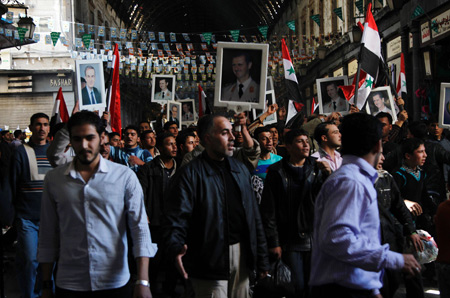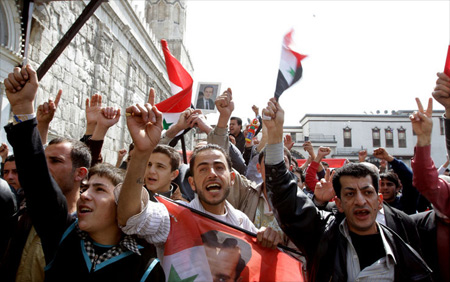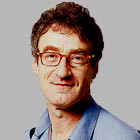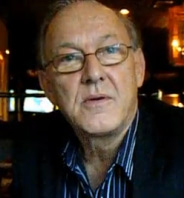…mainstream journalists are appalled that a double Russian and Chinese veto at the UN has thwarted Western efforts to do more good in Syria.
Afghanistan and Iraq may still be in flames. A bloodbath may continue to flow from Nato’s ‘humanitarian intervention’ in Libya. No matter, mainstream journalists are appalled that a double Russian and Chinese veto at the UN has thwarted Western efforts to do more good in Syria. The two powers rejected the latest draft of a UN Security Council resolution condemning the Syrian government and preparing the way for international sanctions.
In the Guardian, Middle East editor Ian Black wrote last week:
‘Bashar al-Assad can certainly feel satisfied that powerful allies have stood by him and prevented international action that might – just – have given him pause for thought as he pursues his vicious crackdown on Syria’s protest movement.’
This is the standard media version of events, repeated endlessly, for example, by the BBC and ITV. We are to understand that the Syrian government is responsible for a vicious repression of peaceful protestors along the lines of Egypt, Tunisia, Bahrain and Yemen. But is it an accurate depiction of the conflict?
In May, Michel Chossudovsky, Professor of Economics at the University of Ottawa, commented on the first outbreaks of violence in Syria:
‘What is clear from these initial reports is that many of the demonstrators were not demonstrators but terrorists involved in premeditated acts of killing and arson. The title of [an] Israeli news report summarizes what happened: ‘Syria: Seven Police Killed, Buildings Torched in Protests.’
The initial conflict, Chossudovsky noted, ‘had all the appearances of a staged event involving, in all likelihood, covert support to Islamic terrorists by Mossad and/or Western intelligence. Government sources point to the role of radical Salafist groups (supported by Israel). Other reports have pointed to the role of Saudi Arabia in financing the protest movement.’ Jeremy Salt, associate professor in Middle Eastern History and Politics at Bilkent University, Ankara, wrote this month:
‘The armed groups are well armed and well organised. Large shipments of weapons have been smuggled into Syria from Lebanon and Turkey. They include pump action shotguns, machine guns, Kalashnikovs, RPG launchers, Israeli-made hand grenades and numerous other explosives. It is not clear who is providing these weapons but someone is, and someone is paying for them.’
 So why do Western media keep referring to a ‘vicious crackdown on Syria’s protest movement’? Chossudovsky explained:
So why do Western media keep referring to a ‘vicious crackdown on Syria’s protest movement’? Chossudovsky explained:
‘The existence of an armed insurrection is not mentioned by the Western media. If it were to be acknowledged and analysed, our understanding of unfolding events would be entirely different. What is mentioned profusely is that the armed forces and the police are involved in the indiscriminate killing of protesters.’
He added some background:
‘Since the Soviet-Afghan war, Western intelligence agencies as well as Israel’s Mossad have consistently used various Islamic terrorist organizations as “intelligence assets”. Both Washington and its indefectible British ally have provided covert support to “Islamic terrorists” in Afghanistan, Bosnia, Kosovo and Libya, etc. as a means to triggering ethnic strife, sectarian violence and political instability… The ultimate objective of the Syria protest movement, through media lies and fabrications, is to create divisions within Syrian society as well as justify an eventual “humanitarian intervention’.
As Chossudovsky observed, Syria is on the US list of ‘rogue states.’ In 2004, in an interview with Democracy Now!, former Nato chief General Wesley Clark recalled a conversation with a Pentagon general in 2001, a few weeks after the September 11 attacks:
‘He reached over on his desk. He picked up a piece of paper. And he said, “I just got this down from upstairs” — meaning the Secretary of Defense’s office — “today.” And he said, “This is a memo that describes how we’re going to take seven countries in five years, starting with Iraq, and then Syria, Lebanon, Libya, Somalia, Sudan and, finishing off, Iran.”’
The Guardian’s Morality Play
Ian Black continued in the Guardian:‘The veto by Russia and China of a binding UN security council resolution threatening unspecified measures against Syria caps months of feverish diplomatic action at the UN. Britain, France and Portugal knew they were facing an uphill struggle, so they diluted and qualified the text of what they were proposing in order to avoid failure. But they failed anyway.
 ‘Since military action was explicitly excluded in the final “blue” draft of the resolution, the optimists thought, or hoped, that Russia might comply.’
‘Since military action was explicitly excluded in the final “blue” draft of the resolution, the optimists thought, or hoped, that Russia might comply.’
But the dilutions and qualifications did not rule out more aggressive action later. The final resolution allowed for the Security Council to consider unspecified measures against Syria after a 30-day period. Former Guardian journalist Jonathan Cook responded to our request for comment:
‘Black mentions the exclusion of “military action” but this is not in itself a guarantee that the US won’t find other ways to bring about regime change. There was plenty of evidence during Israel’s attack on Lebanon in 2006 that the US and Israel were trying to widen the attack to Syria. Israel is very concerned about Syria’s stockpiles of biological and chemical weapons that nearly match its own. It isn’t too far-fetched to see the US using this resolution as a prelude to a variation of the Iraq strategy: demanding Syria destroy its WMD; upping world fury; isolating Damascus; and then allowing/enabling an Israeli attack.’ (Email to Media Lens, October 6, 2011)
‘The US tries to shape the world in ways that are beneficial to its strategic and commercial interests, and does so through arm-twisting and threats to those countries that object but are not strong enough to stand up to its power…
‘This is so obvious it should not even need to be stated. And yet Black’s analysis totally ignores this reality, turning the Security Council vote into some kind of morality play. He is positively misty-eyed about Western interests, as though they were informed solely by a resolute determination to stand up for human rights and the oppressed. His approach is typified by this weasely line:
‘”Beijing, as ever, dutifully followed suit.”
‘As though Britain, France, Portugal and co don’t also “dutifully follow suit” when the US demands it.’
Abandoning any pretense of neutrality, Black continued:
 ‘This is bad news for protesters in Syria, where at least 2,700 have been killed since March, and bad news for those who yearn for a UN that can prove effective, if not in tackling all the world’s ills at once, then at least in responding to one of its most glaring and urgent injustices.
‘This is bad news for protesters in Syria, where at least 2,700 have been killed since March, and bad news for those who yearn for a UN that can prove effective, if not in tackling all the world’s ills at once, then at least in responding to one of its most glaring and urgent injustices.
‘The chorus of condemnation from western capitals sounded genuine.’
The resiliance of Black’s faith in Western moral concern is impressive. This year, the West has supported dictators in Tunisia and Egypt to the bitter end, before dumping the tyrants, hailing a triumph for democracy, and then working for a restoration of the status quo. It continues to support tyrants killing their own people in Yemen, Bahrain and Saudi Arabia. It has criminally exploited a UN resolution to achieve regime change in Libya. It has also promised to veto the Palestinian bid for statehood and membership of the UN. In fact, the West has again shown itself to be a fierce opponent of the cause it claims to be defending in Syria.
Black wrote: ‘Susan Rice, Barack Obama’s ambassador to the UN, expressed outrage. “This will be seen in the region as a decision to side with a brutal regime rather than with the people of Syria,” complained William Hague, “and will be a bitter blow to all those Syrians who have implored the international community to take a stand.”… Privately, but fairly openly, the Russians were accused of being hypocritical and cynical.’
On the World Socialist Web Site, Peter Symonds noted the breathtaking hypocrisy of Rice’s walk-out: the US having, after all, vetoed numerous UN resolutions condemning Israeli crimes.
Source: Media Lens
——————————–
Ian Black is the Guardian’s Middle East editor. In more than 25 years on the paper he has also been its European editor, diplomatic editor, foreign leader writer and Middle East correspondent.
Prof. Michel Chossudovsky, President and Director of the Centre for Research on Globalization (CRG)
Editor of GlobalResearch.ca – Email: crgeditor@yahoo.com


